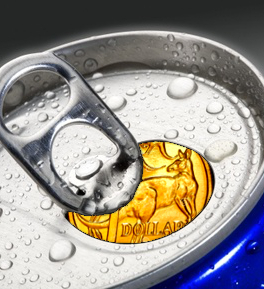Sweet drink tax could can obesity
 The UK Government is imposing a tax on sugary drinks to help tackle obesity, leaving many to wonder if the same thing would work in Australia.
The UK Government is imposing a tax on sugary drinks to help tackle obesity, leaving many to wonder if the same thing would work in Australia.
The two-tier tax will apply from 2018 to drinks containing over 5g of sugar per 100ml, with a higher bracket for drinks above 8g per 100ml.
The tax is designed to bring in more money for childhood health programs, and to persuade manufacturers to work out how to cut sugar levels in their recipes.
The tax will be equivalent to about 34-45 cents per litre, the government says, and will bring in about $1 billion (£530 million).
Some of Australia’s top minds in health and nutrition have reacted to the announcement in the UK’s new budget.
“The first point I would make is that there is widespread public support and acceptance of the idea of taxing sugar among the Australian public. Surveys suggest around 80 per cent public support,” says Dr Gary Wittert, Professor of Medicine at the University of Adelaide and Independent Chair of the Weight Management Council of Australia.
“Secondly, there's no question that the data shows there's harm from consumption of sugared beverages and they're among the most commonly purchased items in supermarkets. In short, they're harmful and we consume a lot of them.
“Drinking sugary drinks is not associated with any benefits, except for luxury and pleasure.”
“There is strong evidence that sugary drinks are associated with increased risk of weight gain in both children and adults, and are among the primary drivers of obesity,” said Professor Amanda Lee, former chair of the National Health and Medical Research Council’s (NHMRC) Dietary Guidelines Working Committee.
“In Australia 25 per cent of Australian children and 63 per cent of Australian adults are now overweight or obese. These high obesity rates are contributing to increasing rates of chronic disease, including type 2 diabetes, cardiovascular disease and some types of cancers, management of which is a huge drain on the public health purse.”
Many pointed to the success of a sugary drinks tax in Mexico.
“The current evidence from Mexico suggests that a well-designed sugary drinks tax is likely to reduce consumption of sugary drinks across the population,” according to Professor Anna Peeters, Professor of Epidemiology and Equity in Public Health at Deakin University.
“We have further information suggesting that it may also reduce socioeconomic inequalities in health while only adding a small amount to the annual food budget.”
“We’ve seen soda taxes introduced in a number of countries worldwide,” says Dr Bridget Kelly, a Senior Lecturer and Course Director in Public Health and Public Health Nutrition at the Early Start Research Institute (ESRI) of the University of Wollongong.
“Including in Mexico where a 10 per cent tax on soda has led to a 12 per cent decline in soda sales a year later. This shows that soda consumption is sensitive to price changes. Taxing tobacco has worked to reduce demand and consumption and now we are seeing the same for taxes on soda.”
“The latest evaluation of the Mexico SSB [sugar-sweetened beverage] tax showed that the tax was effective...importantly, this effect was greater for those with a lower socioeconomic status, where the burden of obesity and non-communicable diseases is also greater,” said Dr Kathryn Backholer, a Senior Research Fellow in Obesity and Population Health, Deakin University.
“Whether the shift in SSB purchases will translate to a reduction in population weight is still unclear, however epidemiological modelling studies of hypothetical taxes suggest that the impacts on weight and health are likely to be important.”
But not everyone agrees.
Bill Shrapnel is the director of Shrapnel Nutrition Consulting, and he also works as an advisor to the Sugar Research Advisory Service, which is funded by The Australian Sugar Industry Alliance and New Zealand Sugar.
Mr Shrapnel says it is just a money grab.
“If taxes are to be imposed on foods associated with weight gain why stop at soft drinks? Why not tax potatoes, white bread, red meat, butter, biscuits, grains, confectionery and fruit juice?” he asked.
“This looks a case of revenue-raising dressed up as public health. Over time I expect the funds raised will end up in general revenue.
“As consumption of sugar-sweetened beverages in Australia is in long-term decline I doubt that this strategy will be attractive to policy makers in this country.”







 Print
Print